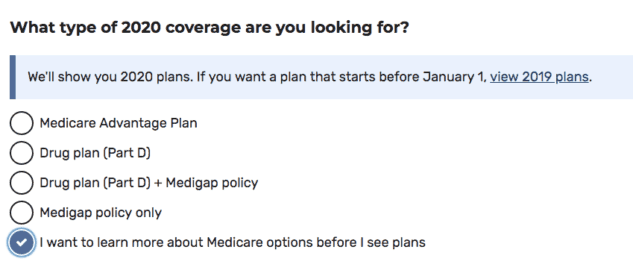
With a little more than a week left of the 2020 Medicare open enrollment season, the Trump administration continues drawing fire for its revamped online tools. On Monday, ProPublica published a scathing report highlighting misleading and inaccurate information on the Medicare Plan Finder. Many of the problems involve prescription drug plans, making it harder for seniors to make optimum choices that take into account not only premium prices, but out-of-pocket costs – which can run in the thousands of dollars, if not more.
One Medicare consultant conducted a test on the Plan Finder tool as if she were an enrollee, and found two versions of the same blood pressure medication on a single plan. One of the medications was covered by the plan, the other was not. The difference in cost was a whopping $2,700 per month. That is only one of myriad errors that can confuse beneficiaries and increase their costs.
“Advocates for seniors worry that the full weight of the tool’s inaccuracies will not be felt until the 2020 coverage year begins and seniors head to pharmacies to fill prescriptions or show up for medical appointments. For many Medicare participants, selections made during open enrollment are irreversible.” – ProPublica, 11/25/19
The Plan Finder is causing confusion across the country. The Associated Press reported Tuesday that Delaware’s insurance commissioner took the rare step of issuing a consumer alert to warn beneficiaries about the tool’s inadequacies.
“The tool is supposed to help find and compare Medicare coverage options, but (it) focuses on premium costs that ‘deflect focus from higher personal costs.’ The tool also shows plans that don’t cover certain medications if residents enter multiple prescriptions… (and) organizes options by lowest premium cost instead of lowest annual costs.” AP/WBOC-TV, 11/26/17
The Centers for Medicare and Medicaid Services (CMS) re-designed the Plan Finder for the first time since 2005, citing necessary software and functional upgrades. CMS spent $11 million to revamp the tool, which consumers complain is not working as it should – and may be, in fact, working against the best interests of beneficiaries. CMS also says that it’s updating the tool as complaints come in.
The rollout of any large, new online tool can be problematic. The Medicare Plan Finder is not the first to have bugs. But digging deeper, some of these issues seem to stem less from expected technical glitches and more from a certain ideological bias.
Since at least 2018, the Trump administration has been tilting the playing field toward private Medicare Advantage plans over traditional Medicare. In both print and online materials, CMS presents enrollee information in a way that makes Medicare Advantage seem like a better deal. As David Lipschutz of the Center for Medicare Advocacy noted, CMS enrollment materials have characterized Medicare Advantage as “less expensive by default” and listed “prior authorizations” for certain types of care as a “benefit,” rather than an impediment, for patients.
While Medicare Advantage plans can have lower premiums, they offer a limited network of physicians and other providers. Claims can be denied with limited opportunity for appeal. Let’s not forget those troublesome prior authorizations that come with many managed care plans. What’s more, private plans often change their pricing and coverage in ways that are hard for consumers to track – even harder if enrollment materials are inaccurate.

The online Medicare Plan Finder does not even list traditional Medicare as an option at the start of this questionnaire
In the face of the Trump administration’s apparent bias toward private Medicare plans, the National Committee and other seniors’ advocates are sounding the alarm:
“We have called upon the administration to level the playing field between traditional Medicare and MA plans. Instead, the President issued an executive order in October effectively doubling-down on that bias. The executive order requires federal agencies to examine regulations and practices to make sure that traditional ‘Medicare is not advantaged or promoted over [Medicare Advantage] with respect to its administration.’ In other words, the executive order aims to solve the exact opposite problem of the one that really exists.” – Max Richtman, National Committee President and CEO, 11/25/19
The National Committee has teamed up with the Center for Medicare Advocacy to provide the public with objective, accurate information about enrollment options. The Medicare Fully Informed Project offers enrollees a variety of educational tools. Unlike the administration, our goal is not to steer enrollees toward one program or the other, but to make sure they are positioned to make the best possible choices for their own health.


